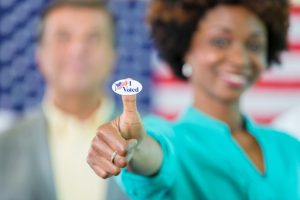 “To the union! / To the revolution! / And the hope that you provide.” — Lin-Manuel Miranda, “Satisfied” (Hamilton)
“To the union! / To the revolution! / And the hope that you provide.” — Lin-Manuel Miranda, “Satisfied” (Hamilton)
It’s been the rainiest autumn in Austin, Texas, on record. The historic flooding of the city has caused city officials to issue a “boil-water ordinance” for the next several days. As I stood in the rain waiting to cast my vote early and witnessed the city scramble to stay afloat — while the HEBs, Walmarts, and Whole Foods all ran out of bottled water — it wasn’t lost on me that Flint, Michigan, was still drowning in its water crisis.
I grew up in the poorest town in the richest county of Michigan. Socioeconomically, the city of Hazel Park has very little in common with the rest of county it resides in. So of course it has been gerrymandered, along with the other cities that border Detroit’s infamous 8 Mile, to be a completely different congressional district than the rest of Oakland County. Flint and Hazel Park form the northeast and southwest borders of the richest area in the state, respectively. When I graduated, my high school had a 50 percent graduation rate; it currently has a 39 percent graduation rate. Meanwhile, Flint is still swamped by water woes.

Transform Legal Reasoning Into Business-Ready Results With General AI
Protégé™ General AI is fundamentally changing how legal professionals use AI in their everyday practice.
For a long time, I believed the system was broken beyond repair and I didn’t bother voting. But growing up on 8 Mile, I became an avid follower of the Detroit civil rights activist Grace Lee Boggs. In her autobiography, Boggs writes:
Until I married Jimmy [Boggs] I had never voted in any election… This was partly because I was moving around so much but mostly because I had internalized the radical rejection of reformist politics. [Jimmy] chided radicals who talked about ‘this lousy country’ for their narrowness, insisting that if you want to make revolution in the United States, you have to love this country enough to change it.
Referring often to the work that his ancestors had put into draining and clearing the land and growing the cotton that was the economic basis of this country’ industrialization in the nineteenth century, he used to say, ‘I hate what they have done and doing to this country, but I love this country not only because my ancestors’ blood is in the soil but because I see the potential of what it can become.’
Until law school, I had never voted in any election. Then I had the opportunity to run phone banks for Bridget Mary McCormack’s (MI) Supreme Court Justice and travel for Mark Totten’s (MI) Attorney General campaigns. Acting as a constituent in these state campaigns made me realize the absolute necessity of voting.
Earlier this year, I featured Colin Allred, a fellow millennial attorney, who is running against Pete Sessions, the current chairman of the House Rules Committee and one of the most powerful people on the Hill, to represent Texas’s 32nd congressional district. I also detailed how SMU Dedman School of Law alumnus Salman Bhojani faced blatant discrimination while running for a seat in the nonpartisan City Council race of Euless, a suburb of Fort Worth, Texas. Without voting there can be no change.

5 Tips For Proving Your Legal Department’s Value
Join our expert panel on March 3rd at 1pm ET to explore actionable, emerging ways you can gather and proactively share the data that demonstrates the impact of your work.
For those of you law students who believe the system is broken beyond repair, who believe our country has become lousy, and who don’t ever plan to throw your hat in the political ring like McCormack, Totten, Allred, and Bhojani — let me share one of the great lessons I learned in law school from a former professor of mine, Jeffrey Kahn.
A few years back, Professor Kahn introduced our Constitutional Law class to the influential economist Albert Otto Hirschman’s concept of “exit, voice, and loyalty.” Hirschman’s premise is relatively straightforward: When consumers or citizens are discontent with their quality of goods or government, they can either withdraw or exit (emigrate), or they can voice their complaint (e.g., protest or vote.). However, as highlighted by Wikipedia:
The interplay of loyalty can affect the cost-benefit analysis of whether to use exit or voice. Where there is loyalty to the organization (as evidenced by strong patriotism politically, or brand loyalty for consumers), exit may be reduced, especially where options to exit are not so appealing (small job market, political or financial hurdles to emigration or moving). Loyal members become especially devoted to the organization’s success when their voice will be heard and when they can reform it.
The Economist does a terrific job of summing up Hirschman’s ultimatum:
[People] can vote with their feet (exit) or stay put and complain (voice). Exit has always been the default position in the United States: Americans are known as being quick to up sticks and move. It is also the default position in the economics profession. Indeed, when his book appeared, Milton Friedman and his colleagues in the Chicago School were busy extending the empire of exit to new areas. If public schools or public housing were rotten, they argued, people should be encouraged to escape them.
In reality, we know the most at-risk in our society may be both trapped from escaping and have their voices (and thus concerns) suppressed. The mere fact you are attending law school reveals your potential to use exit or voice. You are obviously a high agency person. Maybe you are a 1L and haven’t had the chance to take Constitutional Law yet. But once you do, how can you not exercise your franchise? The unparalleled civil rights history of our country is overwhelming evidence that voting is a privilege, right, and responsibility.
Grace Lee Boggs passed away three years ago this month. The American historian Thomas J. Sugrue documented her passing in The New Yorker: “Grace died in her modest six-room house, in a fairly bleak section of Detroit’s East Side, surrounded by her friends and piles of books. By her last days, she was, in her own words, more ‘evolutionary’ than ‘revolutionary’: her projects reflected the more limited sense of possibility than the one that fired up a Depression-era socialist. But she never lost her faith in the people of Detroit.”
For far too many in our country, the right to vote is under attack. Nobody should be too busy to vote. Depending on where you attend law school, you may have to jump through a few hoops to exercise your franchise. But I assure you, people would die to be in your situation. As Rep. John Lewis reminded us earlier this week via Twitter:
I have been beaten, my skull fractured, and arrested more than forty times so that each and every person has the right to register and vote. Friends of my gave their lives. Do your part. Get out there and vote like you’ve never voted before. #vote #goodtrouble
— John Lewis (@repjohnlewis) October 22, 2018
Without voting there can be no change. As a law student, you have the awesome ability to influence what our nation becomes and many years to effect such change. Do you love this country enough to change it? Can you see the potential of what it can become?
Renwei Chung is the Diversity Columnist at Above the Law. You can contact Renwei by email at [email protected], follow him on Twitter (@renweichung), or connect with him on LinkedIn.